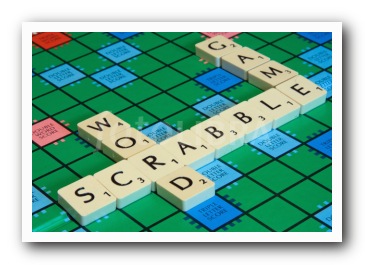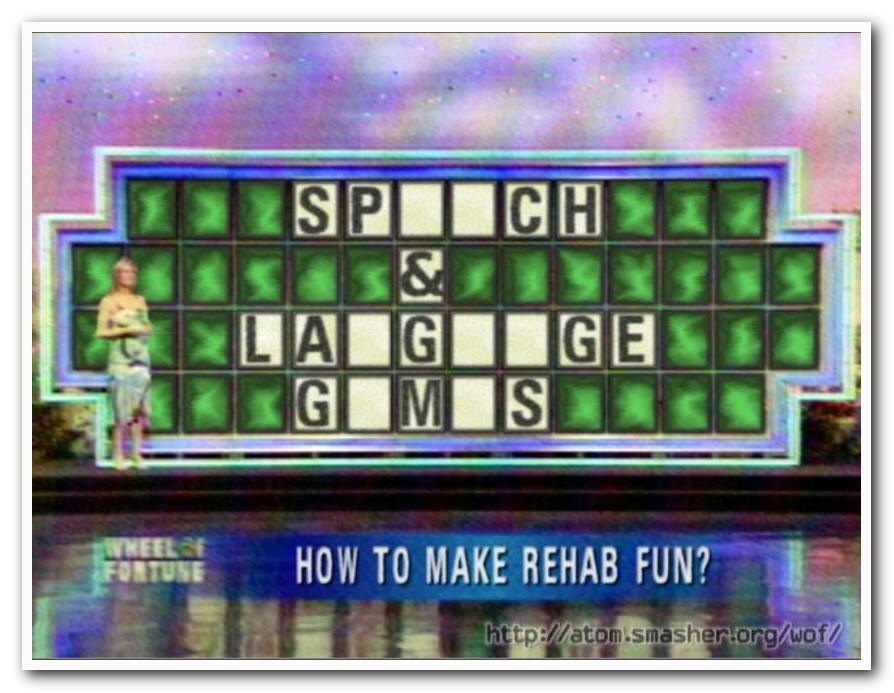4 Fun Aphasia treatment activities for adults
The best speech therapy games (for adults and teens) online, offline, and apps, especially useful for stroke survivors with aphasia.
1. Family Feud
 Remember
this classic TV game, originally with Richard Dawson?
Remember
this classic TV game, originally with Richard Dawson?
And the Research says...
This is similar to a therapy approach called Generative Naming, where the goal is to generate as many words in a category, such as What are thing you use for camping? (tent, flashlight, sleeping bag). There is a fair amount of research suggesting that generative naming helps the patient to generalize better.
Where to play:
- Buy the home game on Amazon (or Walmart, etc.)
- Play it online or
- "watch and play along" on YouTube and pause the video after the question.
The only way I can think to handicap this is to give the survivor more time.
2. Scrabble
 There
are lots of great ways you can use a Scrabble game.
There
are lots of great ways you can use a Scrabble game.
Where to play:
- You can get this at Walmart, if you're one of the 7 families that don't already have it.
- You can play Words with Friends online in Facebook. (I've never played but have friends who do)
- Word with Friends is another social scrabble game on the computer.
- Wordfeud for ipad or Android
How to make scrabble "fair" for the stroke/TBI survivor:
- Survivor chooses new tiles at the end of their turn (so they get to look at them during everyone else's turn.
- Everyone else picks their tiles at the start of their next turn and are given limited time (maybe 1 minute, etc.)
- Survivor gets extra tiles.
But, they still earn a BINGO if they use up 8 tiles (the standard maximum number of tiles a player has). (Or you could say no one is eligible for a BINGO)
- Start off with
giving them 3 extra tiles.
If they win two games in a row, you could reduce the number of extra tiles. - Every game they lose, add one extra tile. So if they get 8+3=11 tiles in their first game and lose, they'd start with 12. If they lose again, they'd get 13. If they won twice, they'd go back to 12.
- Start off with
giving them 3 extra tiles.
- Let the survivor use a dictionary. No one else gets to use one.
3. Wheel Of Fortune
 Can
you solve this puzzle (see right) ?
Can
you solve this puzzle (see right) ?
It's
a TV show. It's a game! It's Both! Players compete to guess the mystery
phrase.
You can :
4. Pictionary + Charades
This is for high-functioning survivors.
The goal is to convey a word or phrase without speaking or writing it. You could play this as a combination of Pictionary (where you draw the clues) and Charades (where you act out the clues), and let the survivor use whatever method they want to communicate. They could:
- Draw a picture
- Pantomime
- Act it out
However, take great care that the survivor isn't embarrassed or "put on the spot".
- Written instructions
and printable word lists
or watch this How-To video - Free online charades on any device, or get the free app for ipad/iphone (with pictures) or Android device
- Printable word-lists by category
Caution:
Pay attention to how the survivor is feeling (how they react) while they play. In a group setting like this they may feel very vulnerable or embarrassed. Make sure the group is accommodating the survivor. Also, you may find the survivor prefers only Guessing or Presenting.
Have you played these or other games have you played
for speech & language?
Chime in below and let me
know!
Don't miss these next issues!
If you discovered this from a friend, sign up below so you don't miss the next issues:
- Using the Scrabble game as a communication board
- Where to get affordable (or free!) speech therapy from the most motivated therapists
- More printable worksheets for reading comprehension, auditory comprehension, etc.
- How to use a common office product to make your a therapy house
- How to do Melodic Intonation Therapy with YouTube
- How to make your own communication board
- How to plan for the end of speech therapy (that insurance provides)
- Aphasia simulator
Every day is an opportunity for recovery. Don't miss a single day.
- Surprising neuroscience discovery that makes recovery possible at any age.
- Why embracing failure leads to faster recovery.
- Unlock your survivor's communication needs in 4 steps.
- How to improve speech & language at the kitchen table.
Clay Nichols
Co-founder of
MoreSpeech and
Bungalow Software
for unlimited speech therapy at home and in the clinic.
 For
3 decades, Clay has helped patients, caregivers and speech pathologists
with speech & language software. He is not a speech-language
pathologist.
For
3 decades, Clay has helped patients, caregivers and speech pathologists
with speech & language software. He is not a speech-language
pathologist.
© 2025 Bungalow Software